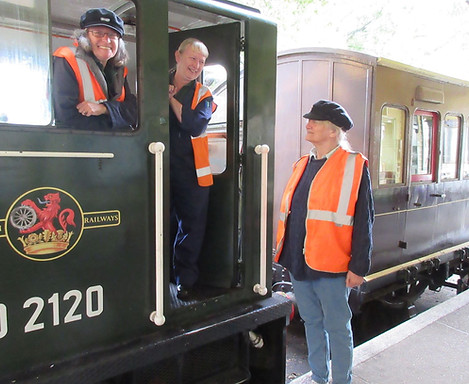

Fawley Museum

Volunteering
If you enjoy being around railways, why not be part of the group that runs Fawley Museum? We are looking for enthusiastic people to join our team of volunteers.
There is a wide variety of activities in which to get involved. Would you like to learn to fire or drive our steam locomotive or learn to drive one of our diesel engines? How about being the Station Master or one of the Signallers during Invitation Days? Could you work on the track and infrastructure with our Permanent Way and Signalling teams?
If small artefacts are more your thing, perhaps you could help in looking after the Museum collection? If larger machinery appeals to you, there are many items in need of restoration for public display.

Fawley can boast one of the few all-female train crews on heritage railways. Drivers Rachel and Diane and guard Sue await passengers at Somersham Station.
All of these activities would benefit from your contribution. If you would like to help us on the railway or in the Museum at any of our events or at our bi-weekly maintenance days, we will be very happy to hear from you. No previous experience is usually necessary and we provide training for all the activities that we undertake.
We hold 'maintenance days' on Tuesdays and Thursdays when volunteers meet to carry out work on the site. this is supplemented with occasional Sundays for those who can't attend during the week.
If you are interested in joining us as a volunteer and would like further information about this, please contact us at enquiries@fawleymuseum.co.uk
What do we do on Maintenance Days?
The collection of artefacts, whether they are static pieces in the museum or operating items on the railway, require constant attention to keep them in good condition. To achieve this, on a typical maintenance day (a Tuesday or a Thursday), you will find volunteers undertaking tasks such as painting, restoring broken equipment, installing new trackwork, overhauling mechanical and electrical equipment, cataloguing the artefacts and cleaning. There is always a queue of rolling stock awaiting refurbishment and repainting; the latest admission to the workshop is our Lancashire and Yorkshire coach 'Judy'. Our rare BSA Truck Mover, which had been in the collection for many years in an inoperable state, has now been returned to working order.

Volunteers carefully remove a vacuum cylinder from a wagon prior to an overhaul. We try to carry out as much maintenance of the vehicles as possible using our own resources.

Workshop facilities on site allow volunteers to fabricate parts that are no longer commercially obtainable


The refurbishment of our collection of station signs is a painstaking but satisfying process. This is a large sign recovered from Bourne End station.
A new 'hands-on' 00 model railway is being constructed


Trains are usually run on maintenance days, which allows signallers to maintain their competency.
We welcome volunteers of all species! The electric signal mechanism undergoes inspection and maintenance.